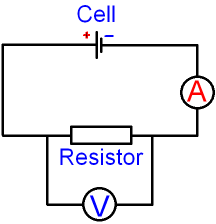
gcsescience.com 10 gcsescience.com
What is a Resistor?
A resistor
is a component that decreases
the current in
a circuit. A resistor
transfers electrical energy into
heat energy.
See the theory of the resistance
of wires.
How is Resistance Calculated?
We can calculate resistance using the equation
voltage = current x resistance V = I x R.
Firstly, we need to measure the
current
flowing
through the resistor and the
voltage
across the resistor.

The
circuit diagram above shows
where to place an ammeter and a voltmeter.
The equation
voltage = current x resistance
V = I x R
can be rearranged to give
resistance
= voltage
÷ current
R =
V
÷ I
If the ammeter reads 2 A, and the voltmeter reads 6 V,
then R =
V
÷ I
= 6
÷ 2
=
3 ohms.
The same method can be used to
calculate the resistance of any component.
![]() Links
Electricity
Resistance
Revision Questions
Links
Electricity
Resistance
Revision Questions
![]()
gcsescience.com Physics Quiz Index Electricity Quiz gcsescience.com
Home GCSE Chemistry GCSE Physics
Copyright © 2015 gcsescience.com. All Rights Reserved.